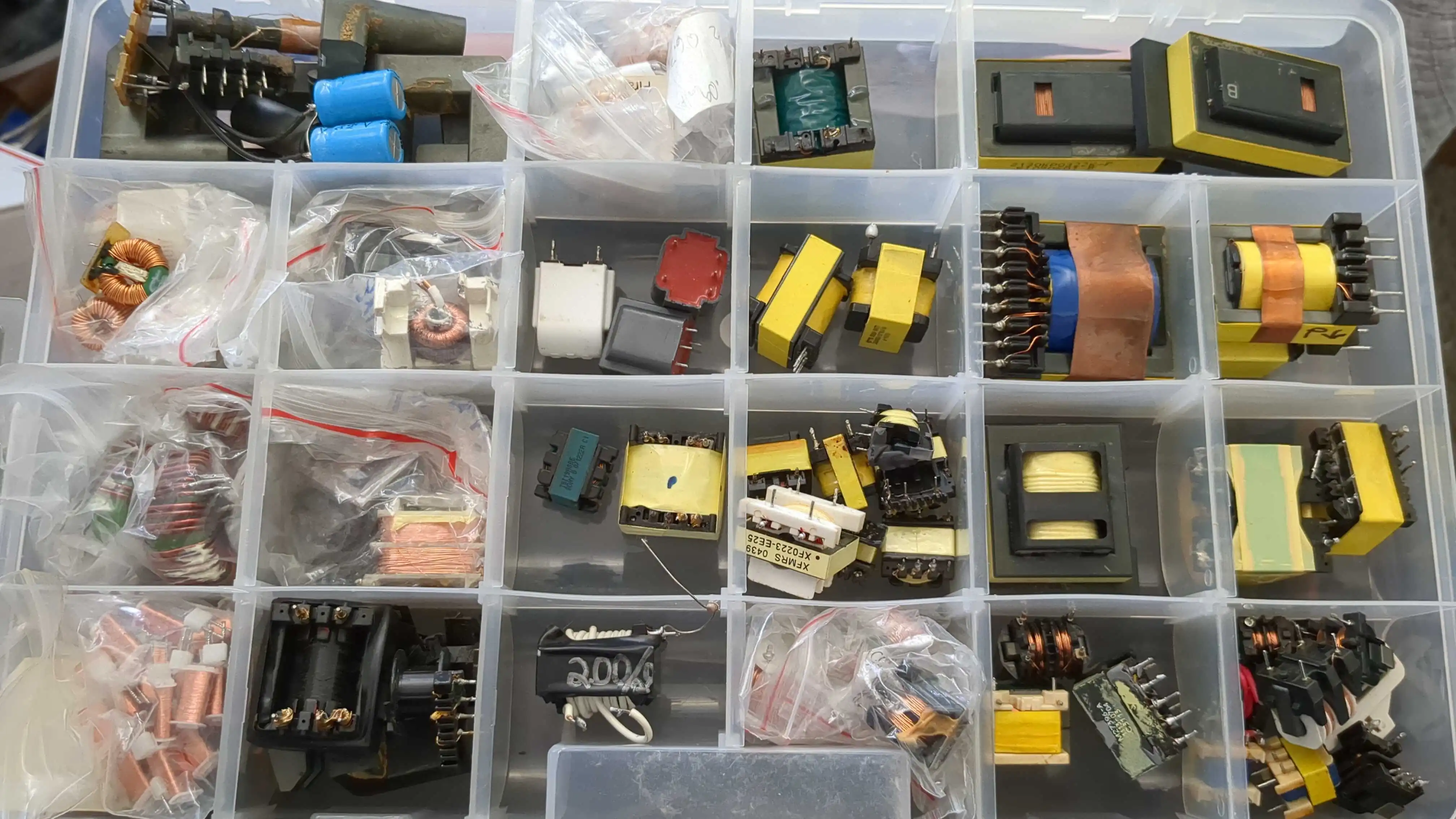Empty words from scum Newsom, the tormentor of the homeless and needy.
phallus–plural phalli or phalluses
Etymology
From Latin phallus (“membrum virile, phallus, or a figure thereof”) from Ancient Greek φαλλός (phallós).
Happy for ya, but I've got nothing to share.
That is insane. It sounds so sadistically impulsive; "hey look something large, wild, and scary." ... "Kill it!"
Don't know much about Stein, but most of what I've heard from Sanders sounds like the kind of sanity that the asylum riots to resist. The USA has no Left.
I'm around 50:50, I read a lot of them but am prone to cynical hot takes on occasion. I'm particularly interested in social community and feeling like I'm at least present with others. Physical disability and in my case, the social isolation it causes–sucks. I'm here when I'm not able to do much else and need to escape. So that is my excuse for the times I'm not reading and the overly cynical hot takes.
That explains it. I made it through the entire Eaternet, the bread board computer, 6502; all that. But pipelines and out of order instructions of the girl-matrix are just beyond my registers.
How many 40-50+ year olds does anyone think are hot
We're all potatoes in the end. New potatoes, sweet potatoes, baked potatoes, dare I even say hot potatoes, grow eyes out of both ends and get mashed into goo in the end. Looks are for tots.
politically correct in a more social the kind of thing a person should do context, like cultural norms
Hike sound like 1st date PC to anyone? I mean, it depends on the definition of hike but someone I barely know dragging me to an isolated place in the woods somewhere sounds like a legit way to end up being drug through the woods with a much higher probability than the typical coffee shop date.
Also, who doesn't have work-mances without deeper meaning? I always have beer after work bros and lunch/break dates with my coworkers but that has no meaning beyond. In fact, I've always had a strict rule of never shit in my own back yard. If I was so inclined as to date someone from work, I would not do so until after finding a new job.
How do you do a filled pastry or dumpling?
I'm looking for the least physical up time (physical disability greatly limits how long I can hold posture). I don't do dairy and I do not want to use a bunch of oil.
The last time I made chicken, I made a bed and stock using beer, apples, onion, potatoes, sweet potato, cumin, cinnamon, and brown sugar. The apples and potatoes were EOL and had to get used for something. This turned out fantastic. I use the chicken and onions for something else and this left me with the stock, all the chicken fat, and the rest. I mashed this and blended it all. It tastes absolutely fantastic like a very sweet and unique pastry filling.
I could easily add some chicken bits and make a dumpling or use the mix in a light and airy filled pastry. What I have not done in over, gosh probably two decades is make any kind of dough or bread.
This could turn into one of the things I play with and tune for years but I need a good low effort cheap entry point for a simple dough and way to cook it that doesn't tax my back hard at all and without any diary.
I like abstracting and understanding what I'm doing on a fundamental level. Pointing me at cultural traditions that fit my constraints is best. With me, there is no such thing as too much detail if you feel like sharing. TIA
There's nothing wrong with disconnecting and enjoying simple things. I love watching some kids movies too. The observation is more nuanced and refers to the way we tend to fail to see our interpersonal growth over time. We tend to see nostalgia without the influence of how we matured. It is like our memory of the thing has matured in imperceptible ways.
I struggle for the words to really describe it outright now that I try. I'm coming from the mindset of writing my own hard science fiction universe and the perspective it has given me, especially when it comes to underlying storytelling frameworks, social/political structures, and defining what is fantasy magic.
Like is a solar ring structure used to make antimatter safely to one way interstellar generation ships magic? It is for the scale of human economy today. Is it fantasy to imagine self replicating drones? I think it is just a matter of time and scale, where I am willing to say at kilometers scale it is possible. It is basically packaging an industrial complex in space. So that seems reasonable. However I find moving faster than causality and space navies childish nonsense. I see exceptionalism as the doctrine of a neo feudal oligarchy, and a story of inevitable tyranny of an authoritarian monster repulsive.
I had no clue about these themes as a child, but now I can't unsee them. I dob not think most people have or care about this kind of defined awareness, but I think these undertones exist just outside of their awareness.
Outside of the philosophical, just telling a congruent story is critical, and those failures are egregious in any story.
Puff puff pass bro
pass
bro...
Doritos or Taco Bell?
I think a lot of that is a product of the bottleneck of information and media back then. People went to the movies because there wasn't as much to do or sources of information. There were not a dozen films competing for your patronage in the same way as in more recent times. The world moved more conservatively slowly where calculating risk was very different. Also ratings were kinda a new and less relevant thing I think, but that was long before I was ever born.
The California culture of risk with enormous funds and technology at the time was also huge and had a big impact on SW that was forging that bleeding edge and melding the old with the new. We're in an upheaval era of promise right now too, but it is orders of magnitude more expensive and complicated than it was in the 1970's-1980's. Even adjusting for inflation there is no comparison between the cost of a silicon chip fab and edge technology between then and now. The price of novel innovation has changed from someone adapting a new idea to someone contracting established firms.
The old ways cost enormous labor. It is fine and manageable when that cost is normalized across society in the cost of living. It is impossible to return to that paradigm once that normalization is lost. Society would collapse if the necessary changes were made to make mass labor viable at the scales of the past. So, the risk changes and so must the media.
I wish they would chase AI, ditch the E-core rubbish and give me an all P- (10 physical) -core unit with the full AVX instruction set, much slower single thread speed, and double the cache bus width to optimise for tensors.
This is the opposite direction with all E core. That is absolutely irrelevant garbage in the present world.
It was a paraphrased quote of Lukas himself that said he made the first films for 10 year olds and the second series for 5 year olds. You need to see it from the perspective of someone willing to risk losing tens to hundreds of millions of dollars in a gamble that is never a sure thing. The artistry is a very minor often overlooked aspect when this kind of money is in play. I've had a job spending a couple of million dollars a year where my mistakes could cost a chain of businesses closing and around three dozen jobs. Buying high end bicycles at that scale requires me to completely disconnect my opinion and style biases and become an account first and foremost. People do not take risks to tell stories, they tell stories that follow an interpretation of statistical metrics.
The targeted movie rating is key to demographic and without a demographic there are no numbers to make a financial argument for the risk. Films are made TO fit, not made AND fit. The risk is never blind.
It destroyed a democracy and lead to terrible civil war and eventually feudalism where most of the population were serfs – aka slaves in all but name. He was a products of his time, but played a large role in a terrible fulcrum in western history.
point to taco
Although that brainless dummy is too stupid to recognize and avoid decoys
point 3... lol
You been doing any 3d printing CAD work lately? /s
The target age demographic is always at most (PG-) 13. Because this target does not change, if the viewer matures, the nostalgia of youth will never align with the expectations of the matured mind. It is the entire tenured ratings system and standardized ultra simplistic morality culture that prevent capitalization on an evolving demographic. Instead, everyone consuming this media is incentivised to remain adolescent of mind or complain about how elements of their childhood fail to align with their evolved and matured expectations.
Describe this butt people. What are your best adjectives with specificity?
What is the better github alt for a free community resource?
They are trying to force 2fa for stalking so I'm about to delete my account. I'm a resource mostly for a few reverse engineered hardware schematics and electronics projects. Last I checked I'm the primary English doc source for some AliEx class hardware. I don't really care enough to make a ton of effort right now. I'm certainly not in a position to pay to host or move. Is there anywhere that just works to transfer stuff with a proton email and no collector,github,com stalkerware nonsense, or verify you're identity to better market you to advertising and freedom of information manipulation trolls?
I have to tune out for awhile
The feed is too anxious and loaded for my self health with my physical disability and social needs. I'm likely impacted in life altering ways too. The only way I can mentally cope is to constrain my thoughts to only worry about the things I can change.
To anyone struggling: please heed this advice and focus on the things you can change. Also, no permanent solutions to temporary problems, if that is an issue.
Do a digital detox and disconnect from everything. Read a book. I'll be finishing Foundations Edge by Asimov as my primary stand in for Lemmy.
I totally understand everyone's emotions, the posts, and comments. I simply don't have the emotional buffer to cope without spiraling.
I'm posting, not because anyone should care if I am around, but more to say to anyone else, it is okay to do the same, maybe even healthy if you find yourself in similar challenging life circumstances. It took me a decade to both recognized where I'm at mentally and learn to act preemptively before things get out of hand. I wish all of y'all the best, better spirits, and many happy days. - your internet friend Jake
Are there any good ongoing 'open source' deep time history visualization projects?
I was just watching PBS Eons about a housecat sized beaver like animal all the way back in the Mesozoic. The thought crossed my mind that it would be interesting if there was a Wikipedia type project for the Universe, Galaxy, Solar system, and Earth. I should be able to see how anything fits into the big picture timeline at a glance.
We should have a culture of nerds that extend beyond the written words of a Wiki. Forget the prestige of some elitist overpriced rag journal that acts as an outdated class and learning barrier in the present, only functioning as a makeshift poor quality reputation filter in the present. I want to see visual timelines where filling in some detail is an expected accomplishment within academia.
As I'm writing this I realized, this connects to how I perceive video based audio/visual information as the primary form of human communication. I think the next evolutionary step in teaching and studies is to forego the lecturer in favor of recorded media of empirically meritorious achievement compiled and tailored to each individual's abilities. Along this line of thought, a scientific discovery should include an expectation to not only add to a public visual timeline archive, but to link the information in a way that teaches and connects the information to the world at large.
I guess I'm saying Science needs a cartographic like department/element where the figurative tree of branching knowledge is strengthened instead of independent niches on an ever expanding fractal edge of exploration. Publishing on the tree should be the driver of meritorious achievement instead of a redundant paper media subscription rag like the present. Reputation shouldn't be limited to a few peers but instead showcased on a world stage that is as messy as reality but beautiful in aggregate. Publishing should involve an obligation to educate effectively where those that are limited in this skill are incentivised to add coauthors that are far more capable of effective communication. Persons with curiosity and time should be capable of freely navigating from what they know in the present to the messy edge of fringe science without any financial or circumstantial limitations in our digital age.
Does anything like this exist yet?
What percentage of lead gets washed off the fingers of a typical human after handling lead solder?
Does anyone know for reals? Is it like leaded gasoline; the more you use it, the less it seems to matter? /s
mortal coil
Etymology
Alluding to Hamlet. The two senses result from two interpretations of the word coil, one taking it to mean “tumult, confusion, fuss”, the other “case, wrapping”. In either case, the phrase “shuffle off this mortal coil” must mean “die”. Since "shuffle off" is generally taken to mean "get rid of" or "evade" it is likely that in the sense that Shakespeare used it, it was specifically referring to the act of suicide.
Noun
mortal coil (plural mortal coils)
- The chaos and confusion of life.
- The physical body of a man (containing the spirit inside).
- https://en.wiktionary.org/wiki/mortal_coil
Adaptor for vertically mounting a Park Tool PCS-10 portable bike stand head

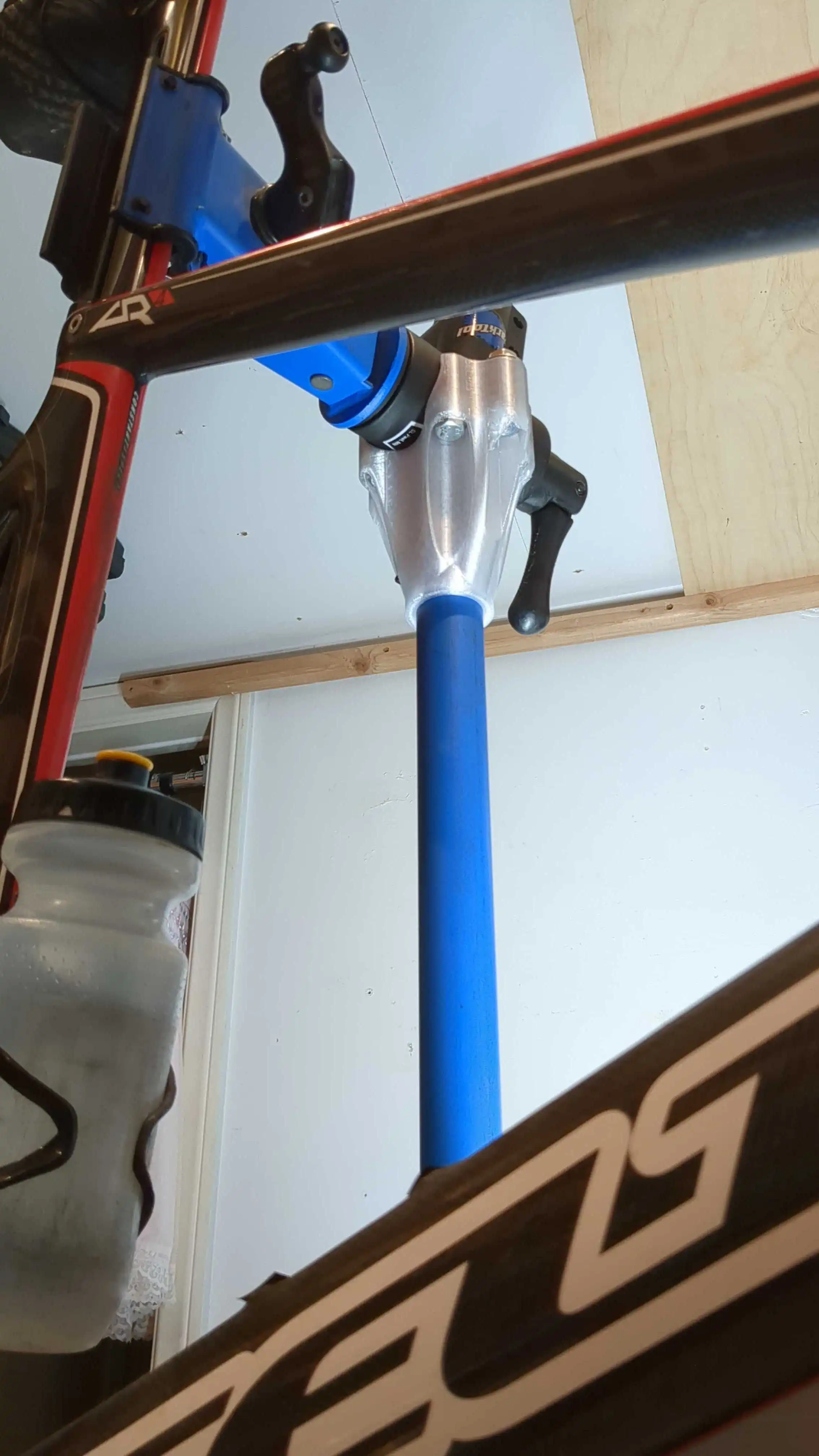
Portable bike stands take up a lot of floor space and suck to deploy and collapse every day. I'm in the process of converting the main stand upright tubes and head to attach to the side of a toolbox cart instead of the base of the portable stand.
Look mah, no supports:
Too much floor space wasted:
I was afraid the pedals wouldn't clear when the head is mounted vertical, but it looks like I still have around 5-10 millimeters of clearance. I still need to design and print the actual clamp mount to the toolbox. This was just a mockup with some wood clamps to check pedal clearance first.
Commercials are not okay
I'll go read or work on a project, but nothing is worth commercials. Sports games are played and fit to the commercials in the USA.
Once upon a time I was into baseball back with Maddux, Smoltz, and Glavine. The Braves were the closest pro team to me as a kid that watched The Sandlot too much.
I've caught bits and pieces of the current World Series in passing, but I walk out with every commercial. I just don't care any more. No content is worth wasting half of my time with whatever wares some shitty billionaire is hocking for rent-scription. I'm worth more than that and I'm not willing to sell myself or my time and interests to these people any more. I reject the premise that this is an acceptable normal. You do you, and value your time accordingly. I see ads as worthless lowlife behavior that belongs scared and intimidated under rocks and hidden in creepy caves. Advertising as some kind of acceptable feature in society or as if it has a right to my time is insulting, demeaning, and unacceptable to me. I reject this dystopia.
Westloki – 3D printed bicycle belt drive conversion (solid continuous loop belt on an unbroken bike frame)


https://www.youtube.com/watch?v=x79l7UO_qww
Caveat: The bike used is an e-bike with a powered wheel. The pedals have very little load requirements and no long-term or load testing is shown. As one of the most hardcore roadies you'll ever interact with, personally, I believe this would not last more than a week if it could survive a single ride on a traditional bike and someone like myself based on my first impression of the design. Still, the idea is impressive to me. In practice, a robust enough design will likely outweigh a chain drive by an order of magnitude. The reason the chain and cog transmission is standard is because of the balance of weight to durability. Every single gram matters on a bicycle far more than may be apparent at first.
pareidolia
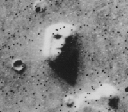
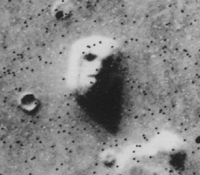
Noun
pareidolia (plural pareidolias)
- (psychology) The tendency to interpret a vague stimulus as something known to the observer, such as interpreting marks on Mars as canals, seeing shapes in clouds, or hearing hidden messages in music.
Etymology
Borrowed from German Pareidolie, constructed from Ancient Greek παρα- (para-, “alongside”) + εἴδωλον (eídōlon, “image”) + -ία (-ía).
Links
- [email protected]
- https://en.wiktionary.org/wiki/pareidolia
The USA's Arecibo Telescope Report after its collapse in 2020
An investigation by the National Academies of Sciences, Engineering, and Medicine found Hurricane Maria worsened a slow decay of the Arecibo Observatory's support cables.

Hurricane Maria did major damage to the Puerto Rican telescope in 2017 that lead to the collapse of this world class iconic radio telescope 3 years later after failing to get funded and maintained. It was the largest for the USA by a long shot at 305 meters. China's FAST became the largest at 500 meters in 2016. This is Trump's (2017-2020) legacy for Puerto Rico.
Pineapple pickle


Came out like a slightly savory barely fruity pickled cucumber or olive like flavor. It's only useful for sauce complexity. It has a sustained savory aspect to the aftertaste that is more positive than the initial slightly vinegar like bite.
...but maybe round two will be better.
A plum is in the tiny jar.
Day 3 of corset dude: overhead lighting

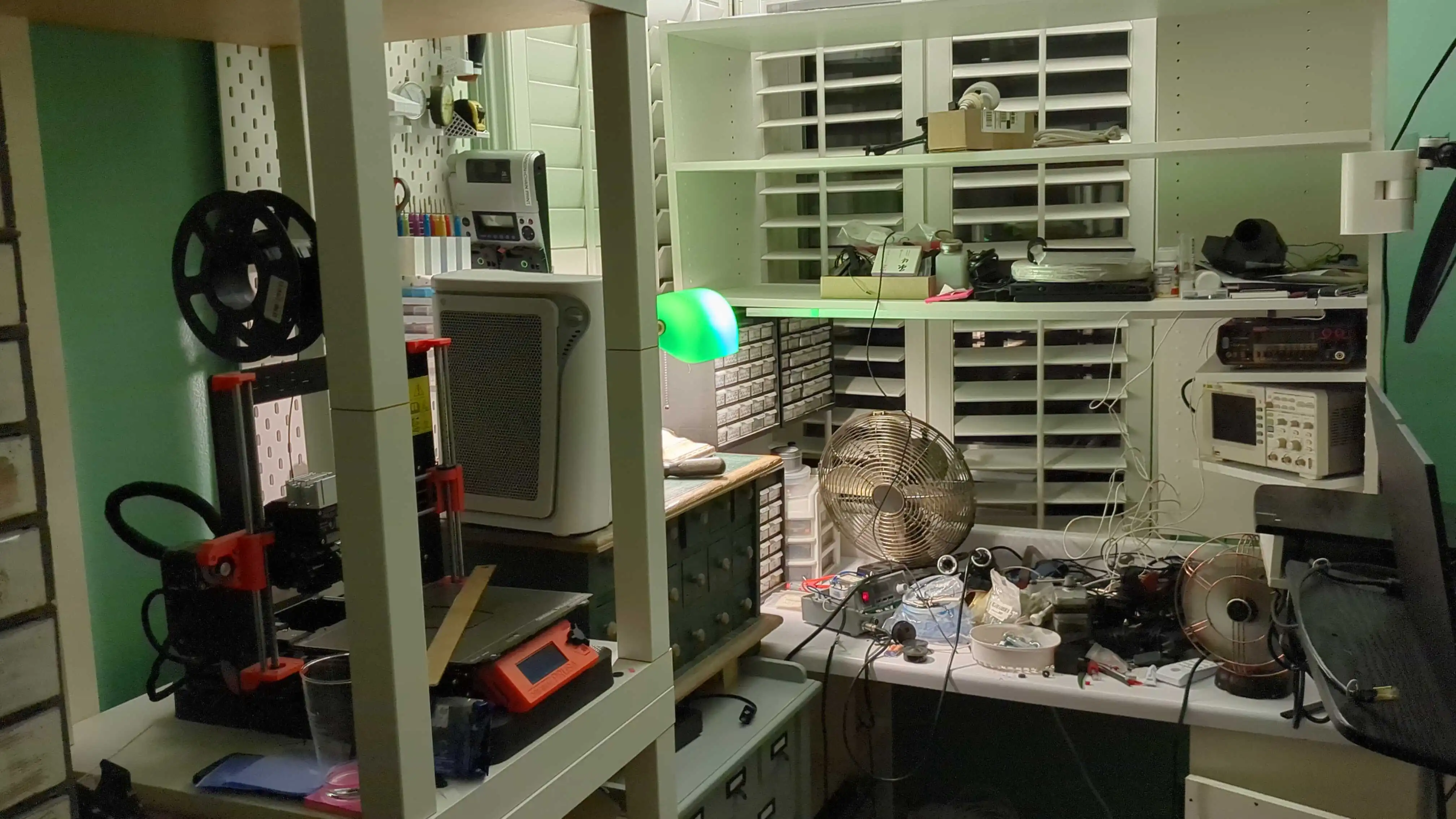
Overhead LED strips wired and lots more junk shuffled. The critical test of whether the corset would alter my mobility substantially seems to be passing so far. I can still sleep after being upright most of the day. I still need to wire the strips under the bottom desk-shelf, and have a ton of junk to sort and organize properly. Does anyone else here treat a bedroom like a tiny house lab?
Does giving up on yourself require giving up on everyone else?
I am cleaning up a years old mess and mulling over abstracted inner philosophy as one does. So why do other people care if someone wants to check out, punch their own card, start life retirement. Why would there ever be a stigma or law against such a thing, (other than profiteering from misery). In my attempt to reason why some worthwhile human might find it offensive, independent of outside influences like religion, the only thing I can think of is the idea, "to give up on one's self implies giving up on everyone else," like perhaps the person that takes offense does so out of their desire to help but lacks an effective means or opportunity. True/not true, is there some facet I am neglecting? What do you think?
Chris Borge – They printed a better lathe (using concrete in a 3d printed shell rev 2)

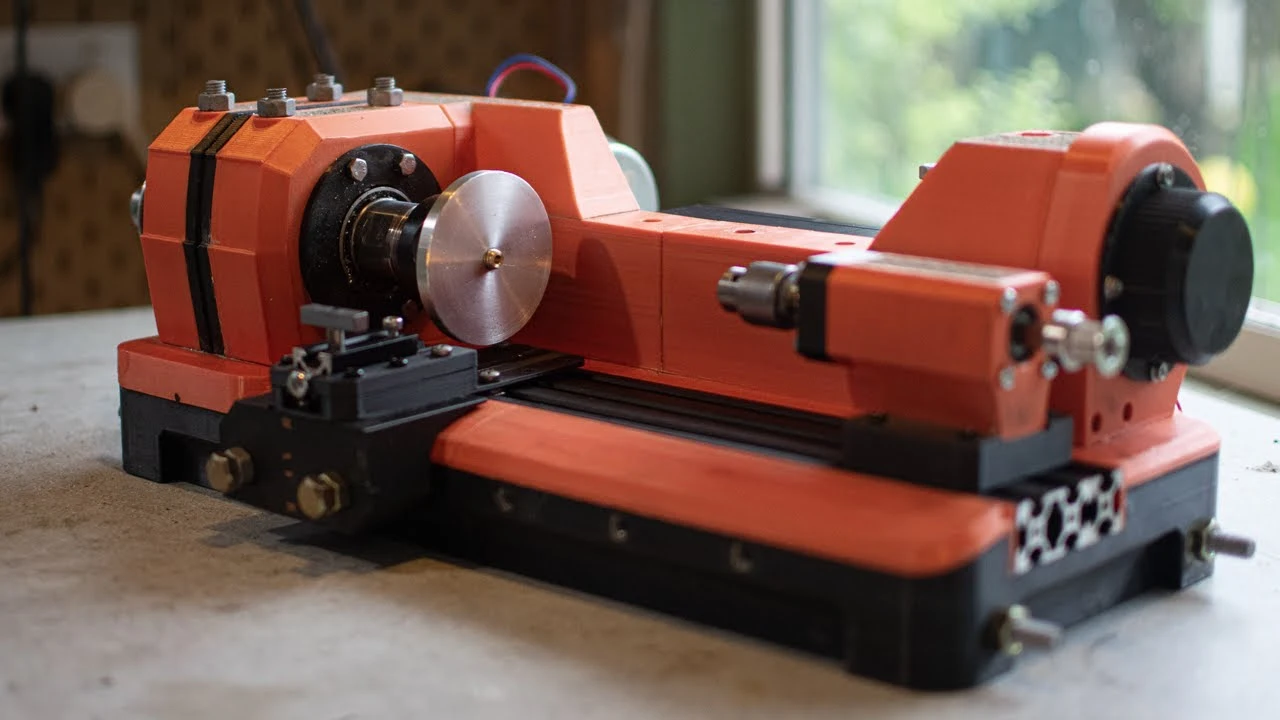
https://www.youtube.com/watch?v=6Js8erWbsDQ
video description text:
Want to see more tools like this? Im a finalist in the Prusa awards and winning would fund literally dozens of tools like this and help me keep the files free!
https://www.printables.com/awards (vote for the ball vise, its bright orange :) )
Parts: Uploading tomorrow morning
Music: Minecraft soundtrack
Like subscribe all that stuff
0:00 intro
1:12 build
4:30 concrete time BAYBEEE
6:01 ready to use
9:58 thoughts My name is Chris, I am a 3D printing hobbyist from australia. I dont really specialise in anything specific, but 3D printed tools and tabletop accessories are some things youll probably seen quiet often. I do all my 3d printing on a Ender 3, which I highly recommend as a budget printer. Currently I only run 1 printer but I hope to expand that in the future. Recently acquired a photon 0 to do resin printing with. I like to share all my 3D printing ideas for free although I do plan to sell stuff in the future. Most of my projects will be mostly 3D printed with a few non printed components included, these can often be found on ebay. I actually use the cheapest filament I can get for all my projects, again I hope to change this in the future.
I've been watching Chris' lathe builds for awhile. This concrete pour seems like a really useful idea. The lessons learned and advice given here are valuable insights into the practical aspects of this technique.
My main underlying curiosity is what happens when such a methodology is used to create automated single purpose machines.
Hope is a funny thing
I was hit by a couple of SUV's in a crash while riding a bicycle to work 2/26/14. I have chronic spinal issues. I haven't really allowed hope to know me since 2017. A lot happened then. I kinda fell apart and had to come to terms with my limitations and disappointments from people I really needed to rely on. Hope became a destabilizing force; a danger I needed to protect myself from.
I've seen over a dozen neurosurgeons, and several pain management specialists. I've had physical therapy until I was broke. Never once did a doctor actually try to break down the problems or recommend someone who would. I complained about how I could be in tremendous pain just before a MRI but within a few minutes of lying flat, I felt fine. No MRI has ever shown anything major wrong with me. I even went as far as bribing the tech and radiologist with coffee shop gift cards and stuff to try and get them to take extra time and effort. Still nothing ever helped.
Today, I put on a corset thing for the first time. I haven't been able to turn my head left in over 10 years. As soon as I tightened this thing, I can turn my head left again and there is no restriction that I can feel. I haven't sat upright at a table in a straight chair in over 10 years, but I did so today. I was so elated about sitting there I wrote this stupid long reply to someone. I didn't know what to do with myself. Normally the pain would kick in and stop me, but I just kept going.
I'm laying in bed now out of habit and caution, but for the first time in many years I feel anxious about staying here, capable, like I could get up and do something without the punishment of major pain.
I feel like a scared abused animal nearly unable to move out of this mental space; to allow hope a place in my mind. I have no idea where this ultimately leads. My inner cynic wants to laugh at the ten years of my life wasted when all I needed was a simple brace; all those reputable doctors failing at something so fundamentally simple; that my own uneducated intuition eventually lead me here on my own.
I asked here when the idea to try this first crossed my mind. Y'all pushed me to try it. Thanks. I still hesitated for whatever reason, but now I'm trying it. I'm scared to even admit it, but this feels different, it feels like hope, and that is something I really needed.
Dana Point California 10-21 7pm


A picture of the beach after sun down, light waves, sparse twilight clouds reflect an orange horizon chased by a lavender blue sky. In the distance a small rock jetty crosses the image faintly; origin unknown. Beyond, in the distant horizon, Catalina Island commands the Sol's interregnum in bronze silhouette.




